Voice search has changed how people find information online. With smart speakers in millions of homes and virtual assistants on every smartphone, businesses need to adapt their SEO strategies to stay visible. For agencies juggling multiple clients and services, partnering with white label SEO providers offers a smart solution to master voice search optimization without stretching resources thin.
This comprehensive guide explores how agencies can use white label SEO services to optimize voice search content, boost client rankings, and stay ahead of the competition. We'll cover practical strategies, current statistics, and actionable insights that can transform your agency's approach to voice search.
Why Voice Search Matters More Than Ever?
Voice search isn't just a trend—it's become a fundamental part of how consumers interact with technology. The numbers tell a compelling story about this shift in user behavior.
Statistics and Trends
Recent data reveals that 27% of the global online population uses voice search on mobile devices. This represents millions of potential customers who rely on spoken queries rather than typed searches. Even more telling, 58% of consumers use voice search to find local business information, making it essential for businesses with physical locations or local service areas.
The growth trajectory shows no signs of slowing down. Smart speaker ownership has reached 35% of US adults, with many households owning multiple devices. These users aren't just asking about the weather—they're searching for products, services, and local businesses through voice commands.
The Voice Search Revolution: How User Behavior Is Changing?
Voice search has fundamentally altered search patterns in three key ways:
Conversational queries are replacing short-tail keywords. Instead of typing "pizza Chicago," users now ask, "Where can I get the best deep dish pizza near me?" This shift requires content that matches natural speech patterns and longer, more specific phrases.
There's been a surge in "near me" and local-intent voice searches. Voice search users are often mobile and looking for immediate solutions. They want businesses they can visit or services they can access quickly in their area.
Search engines are using AI to understand context-driven results. Modern algorithms consider tone, intent, and location when processing voice queries. They're getting better at understanding what users want, even when the query isn't perfectly phrased.
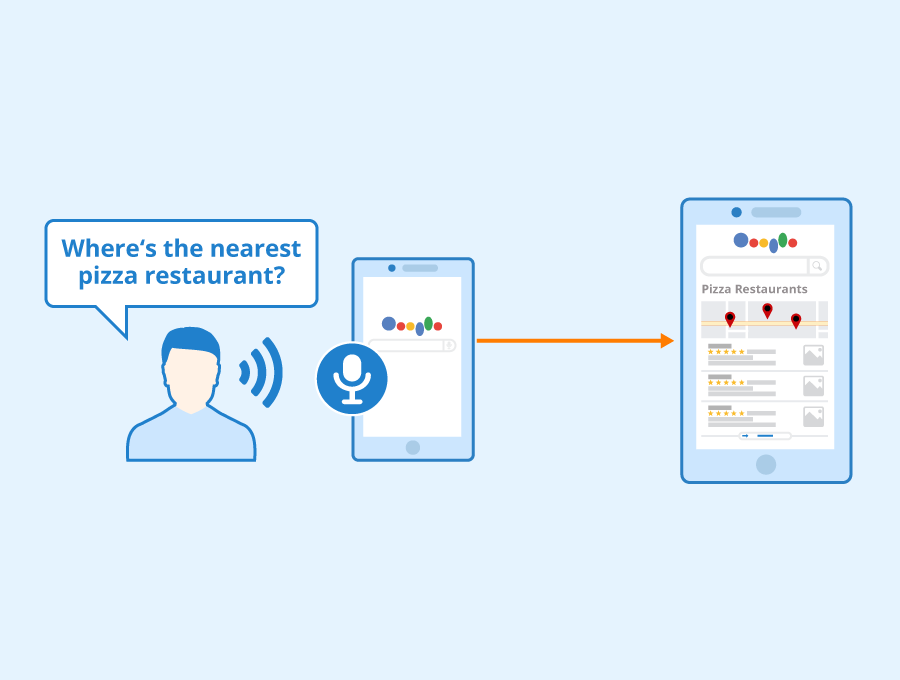
Image Source: Seobility
Impact on Local Businesses
Local businesses feel the impact of voice search most directly. When someone asks their smart speaker for a "good Italian restaurant nearby," they expect relevant, local results. Businesses that haven't optimized for these conversational, location-based queries miss out on qualified leads who are ready to make purchasing decisions.
This creates both challenges and opportunities. Businesses need to ensure their online presence includes the natural language phrases their customers use when speaking to devices. They also need to maintain consistent information across all digital platforms so voice assistants can confidently recommend them.
Why Agencies Need White Label SEO for Voice Optimization?
Voice search optimization requires specialized knowledge and dedicated time—two resources that many agencies struggle to maintain while serving multiple clients. This is where white label SEO outsourcing becomes valuable.
Why Outsourcing Makes Sense for Voice Search?
Voice search optimization is resource-intensive because it touches every aspect of SEO. Agencies need to research conversational keywords, update content strategies, implement technical improvements, and monitor performance across different voice platforms. For agencies already managing multiple service offerings, adding this specialized expertise in-house can strain budgets and timelines.
White label SEO providers have already invested in the tools, training, and processes needed for effective voice search optimization. They understand the technical requirements and stay current with algorithm changes that affect voice search results.
The Advantages
- Specialized Expertise in Conversational Content Creation: White label SEO providers understand how to craft content that sounds natural when read aloud by voice assistants. They know how to structure answers that directly address common voice queries.
- Technical Setup Handled Professionally: Schema markup, page speed optimization, and mobile-first indexing require technical expertise that takes time to develop. White label SEO providers have teams dedicated to these crucial backend improvements.
- Continuous Algorithm Tracking and Adaptation: Voice search algorithms evolve rapidly as AI technology advances. White label SEO providers monitor these changes and adjust strategies accordingly, ensuring clients maintain their visibility.
- Scalability Without Overhead: Agencies can serve more clients without hiring specialized voice SEO staff. This allows them to expand their service offerings and increase revenue while maintaining quality standards.
- Access to Premium Tools Without Additional Investment: Professional voice search optimization requires specialized software for keyword research, performance tracking, and competitor analysis. White label SEO providers include access to these tools in their service packages.
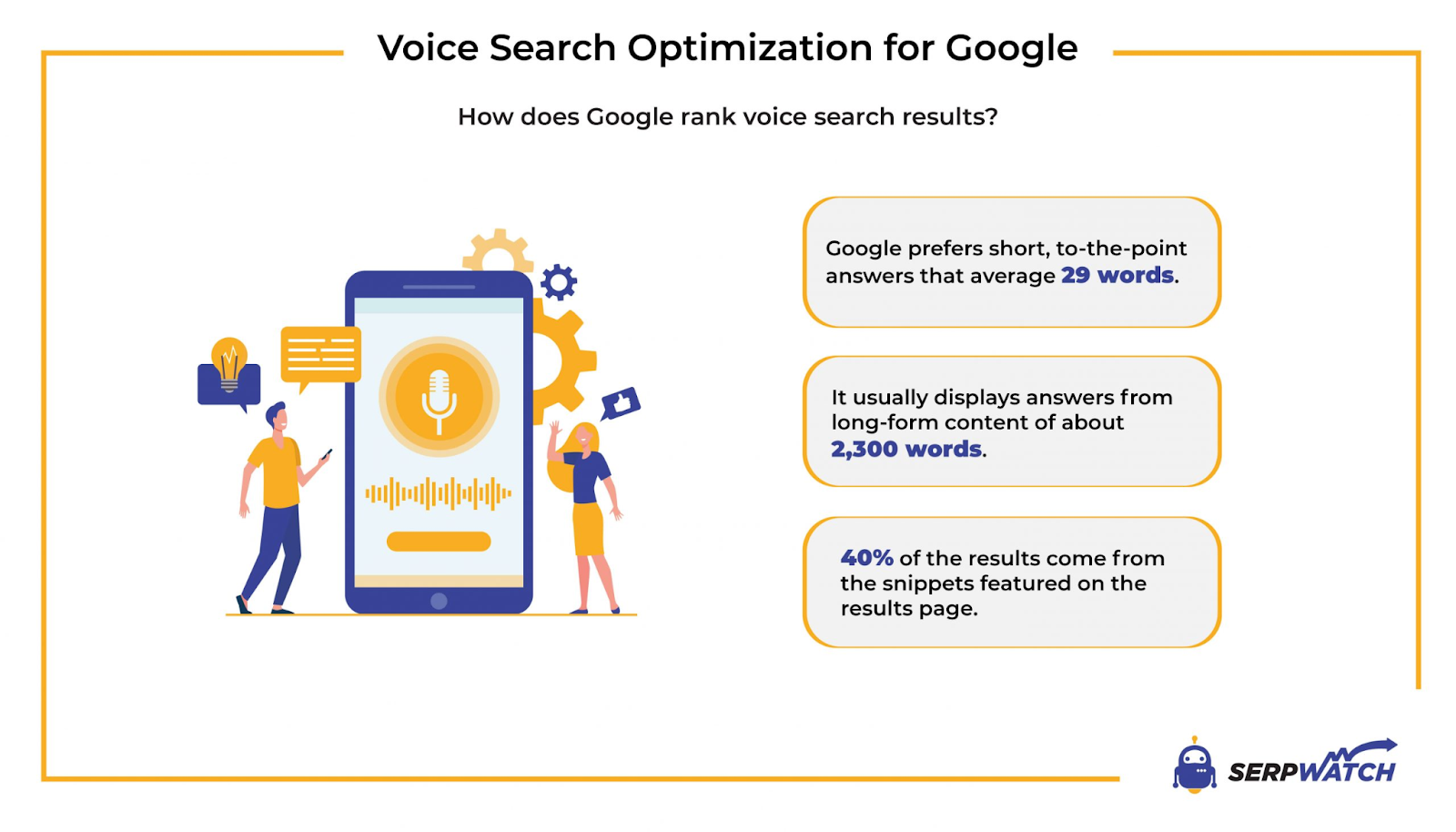
Image Source: SERPWatch
Key Strategies for Voice Search Optimization Using White Label SEO Services
Effective voice search optimization requires a multi-faceted approach that addresses content, technical elements, and local search factors. Here's how white label SEO services can implement these strategies efficiently.
A. Focus on Conversational Keywords and Phrases
Voice queries sound different from typed searches. Users speak in complete sentences and ask direct questions. White label SEO providers excel at identifying these natural speech patterns and incorporating them into content strategies.
- Identify Natural Speech Patterns: Instead of focusing solely on "marketing agency," voice-optimized content targets phrases like "What's the best marketing agency near me?" or "How do I choose a digital marketing company?"
- Use AI Tools to Simulate Human Voice Queries: Advanced keyword research tools can predict how people phrase voice searches related to specific industries or services. White label SEO providers use these insights to create comprehensive keyword strategies.
- Implement Long-Tail Keyword Strategies Effectively: Voice searches tend to be longer and more specific than typed queries. White label SEO teams understand how to naturally incorporate these longer phrases without compromising content quality.
B. Optimize for Local SEO
Local optimization becomes even more critical with voice search since many queries have local intent.
- Update Google Business Profiles Completely: This includes accurate business hours, contact information, photos, and regular posts. Voice assistants often pull information directly from these profiles.
- Maintain NAP Consistency Across Directories: Name, Address, and Phone number information must match exactly across all online directories. Inconsistencies confuse voice assistants and hurt local rankings.
- Target Location-Based Keyword Phrases: Content should include natural references to the service area, local landmarks, and community-specific terms that residents use.
- Build Location-Specific Content: Creating pages that address local needs and reference local events or characteristics helps establish relevance for location-based voice searches.
C. Improve Technical SEO for Voice Search Compatibility
Technical optimization ensures that voice assistants can easily access and understand website content.
- Implement Schema Markup Strategically: Structured data helps search engines understand content context and increases the likelihood of appearing in featured snippets—a key source for voice search answers.
- Optimize for Featured Snippets: Voice assistants often read featured snippet content when answering questions. Content should be structured to provide clear, concise answers that search engines can easily extract.
- Ensure Fast Page Speeds: Voice search users expect immediate answers. Slow-loading pages get bypassed for faster alternatives, making speed optimization crucial for voice search success.
D. Create Voice Search-Friendly Content
Content optimization for voice search requires a different approach than traditional SEO writing.
- Write in a Conversational Tone: Content should sound natural when read aloud. This means using contractions, shorter sentences, and everyday language rather than formal business terminology.
- Use FAQ Formats Strategically: The FAQ pages directly address the question-and-answer format of voice searches. They provide opportunities to target specific voice queries while improving overall user experience.
- Structure Content for Easy Extraction. Use headers, bullet points, and clear topic divisions that make it easy for search engines to identify relevant information for specific voice queries.
E. Mobile Optimization and Page Speed
Mobile optimization becomes even more important with voice search since many voice queries come from mobile devices.
- Prioritize Mobile-First Design: Websites must work perfectly on mobile devices since voice search users often continue their journey on smartphones or tablets.
- Implement Accelerated Mobile Pages (AMP) Where Appropriate: Faster loading times improve the likelihood of being selected for voice search results.
- Conduct Regular Technical Audits: White label SEO providers can perform comprehensive technical audits to identify and fix issues that might prevent voice assistants from accessing content.
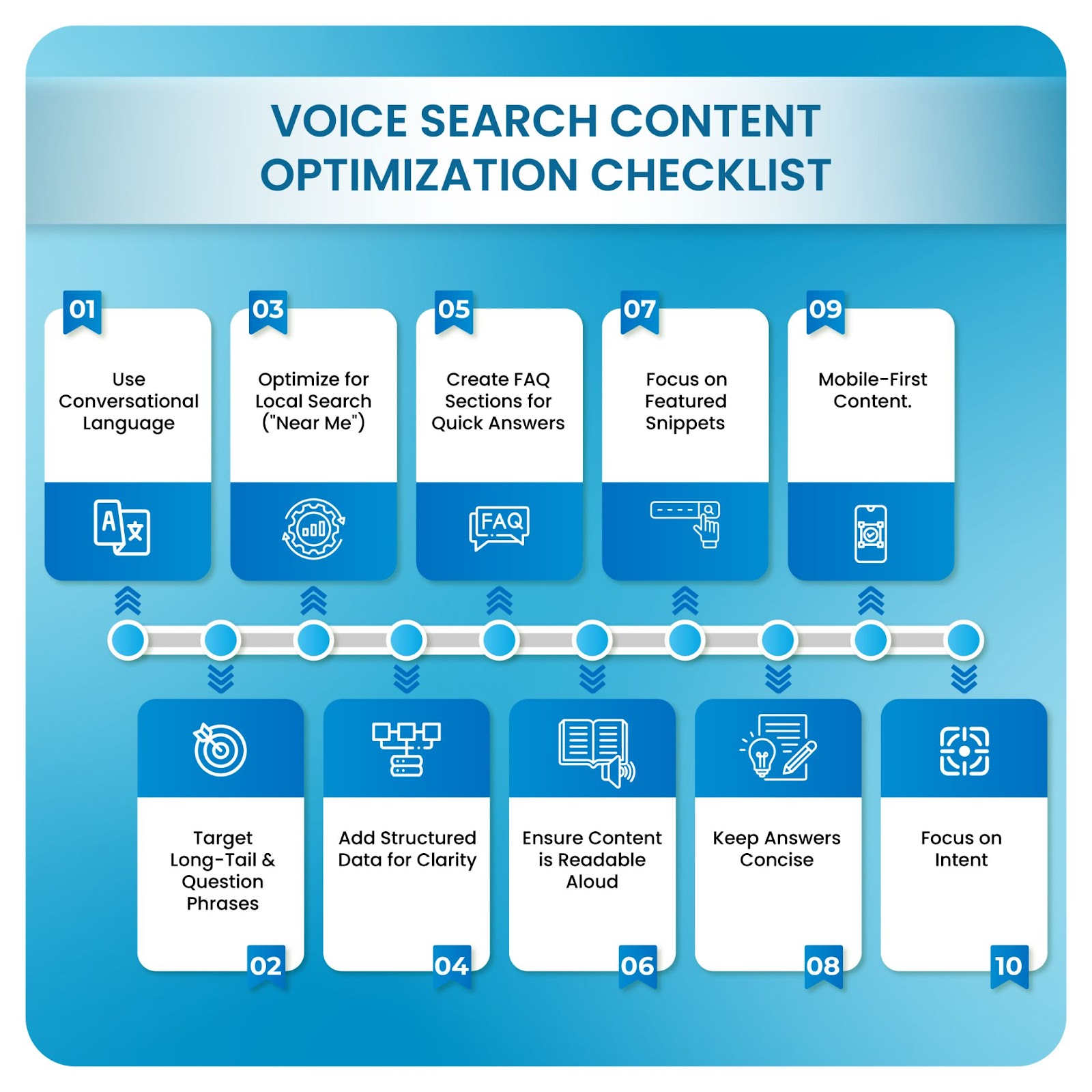
Advantages of Partnering With a White Label SEO Agency
Partnering with a white label SEO agency offers numerous benefits that go beyond just voice search optimization.
- Access to Specialized Voice SEO Expertise: White label SEO providers have dedicated teams trained specifically in voice search optimization. These specialists understand the nuances of conversational content, technical requirements, and local optimization strategies that drive voice search success.
- Faster Implementation and Scalability: Ready-to-deploy processes allow agencies to roll out voice search optimization for multiple clients simultaneously. This scalability is particularly valuable during high-demand periods or when acquiring new clients rapidly.
- Advanced Tools Without Additional Investment: Premium voice search tools can cost thousands of dollars annually. White label SEO providers include access to these tools in their service packages, giving agencies professional-grade resources without separate licensing costs.
- Consistent, High-Quality Deliverables: Standardized processes ensure every client receives thorough voice search optimization. White label SEO providers use proven frameworks that deliver consistent results across different industries and market conditions.
- Local Search Mastery: Voice search success often depends on local optimization expertise. White label SEO providers understand the intricacies of Google Business Profile optimization, local citations, and location-based content strategies.
- Continuous Algorithm Monitoring: Voice search algorithms change frequently as AI technology advances. White label SEO providers track these changes and update strategies proactively, ensuring clients maintain their visibility without agencies having to monitor multiple algorithm updates.
- Reduced Operational Burden: Agencies can focus on client acquisition, relationship management, and strategic growth instead of handling technical execution and performance monitoring.
- Data-Driven Reporting: White label SEO providers deliver comprehensive reports showing voice search traffic growth, featured snippet wins, and local ranking improvements. This data helps agencies demonstrate value to clients and identify expansion opportunities.
- Competitive Edge for Agencies: Offering voice search optimization positions agencies as forward-thinking partners who understand emerging marketing trends. This differentiation helps win new clients and retain existing ones.
Measuring and Refining Voice Search Success
Tracking voice search performance requires different metrics and approaches than traditional SEO monitoring.
A. Performance Metrics
- Voice Traffic Share: Track the percentage of organic traffic coming from voice searches. This metric shows whether voice optimization efforts are attracting the intended audience.
- Featured Snippet Rankings: Monitor how many featured snippets client websites earn, since voice assistants frequently source answers from these positions.
- Local Pack Ranking Improvements: Track improvements in local search visibility, particularly for "near me" queries that often originate from voice searches.
- Question-Based Keyword Rankings: Monitor performance for conversational, question-based keywords that mirror natural speech patterns.
- Organic Traffic From Long-Tail Keywords: Voice searches tend to be longer and more specific, so tracking traffic from these extended phrases indicates voice search success.
B. Adapting to Trends
White label SEO providers continuously monitor algorithm updates and adjust strategies accordingly. They track changes in how voice assistants select and present information, ensuring optimization efforts remain effective as technology evolves.
C. Client Satisfaction
Regular performance reporting by white label SEO providers improves client trust and satisfaction. Detailed reports show progress in voice search visibility, local rankings, and organic search traffic growth, making it easy for agencies to demonstrate value.
How DashClicks Optimizes Voice Search Content?
DashClicks understands the growing importance of voice search optimization and offers comprehensive white label SEO services designed to help agencies capitalize on this trend. Their approach combines technical expertise with practical implementation, ensuring clients achieve measurable results in voice search visibility.
The DashClicks team specializes in conversational content creation, local SEO optimization, and the technical elements that make websites voice-search friendly. They provide detailed reporting that shows improvements in voice search traffic, featured snippet wins, and local ranking boosts, helping agencies demonstrate clear value to their clients.
Common Pitfalls in Voice Search SEO (and How White Label SEO Services Prevent Them)
Many businesses make critical mistakes when attempting voice search optimization independently. Understanding these pitfalls helps agencies appreciate the value of professional white label local SEO services.
1. Ignoring Conversational Tone
The Mistake: Continuing to optimize for short, choppy keywords instead of natural speech patterns.
How White Label Services Help: Professional content creators understand how to write in a conversational tone that matches how people speak to voice assistants.
2. Missing Schema Markup Opportunities
The Mistake: Failing to implement structured data that helps search engines understand content context.
How White Label Services Help: Technical teams systematically implement appropriate schema markup to improve featured snippet visibility and voice search eligibility.
3. Overlooking Local Search Optimization
The Mistake: Neglecting Google Business Profile optimization and local citation building.
How White Label Services Help: Local SEO specialists ensure all local search elements are properly optimized and maintained for maximum voice search visibility.
4. Slow Mobile Page Speeds
The Mistake: Ignoring page speed optimization, especially on mobile devices.
How White Label Services Help: Technical audits identify and resolve speed issues that prevent voice assistants from efficiently accessing content.
5. Not Tracking Voice-Specific KPIs
The Mistake: Using traditional SEO metrics that don't capture voice search performance.
How White Label Services Help: Comprehensive reporting includes voice-specific metrics that show actual progress in voice search visibility and traffic.
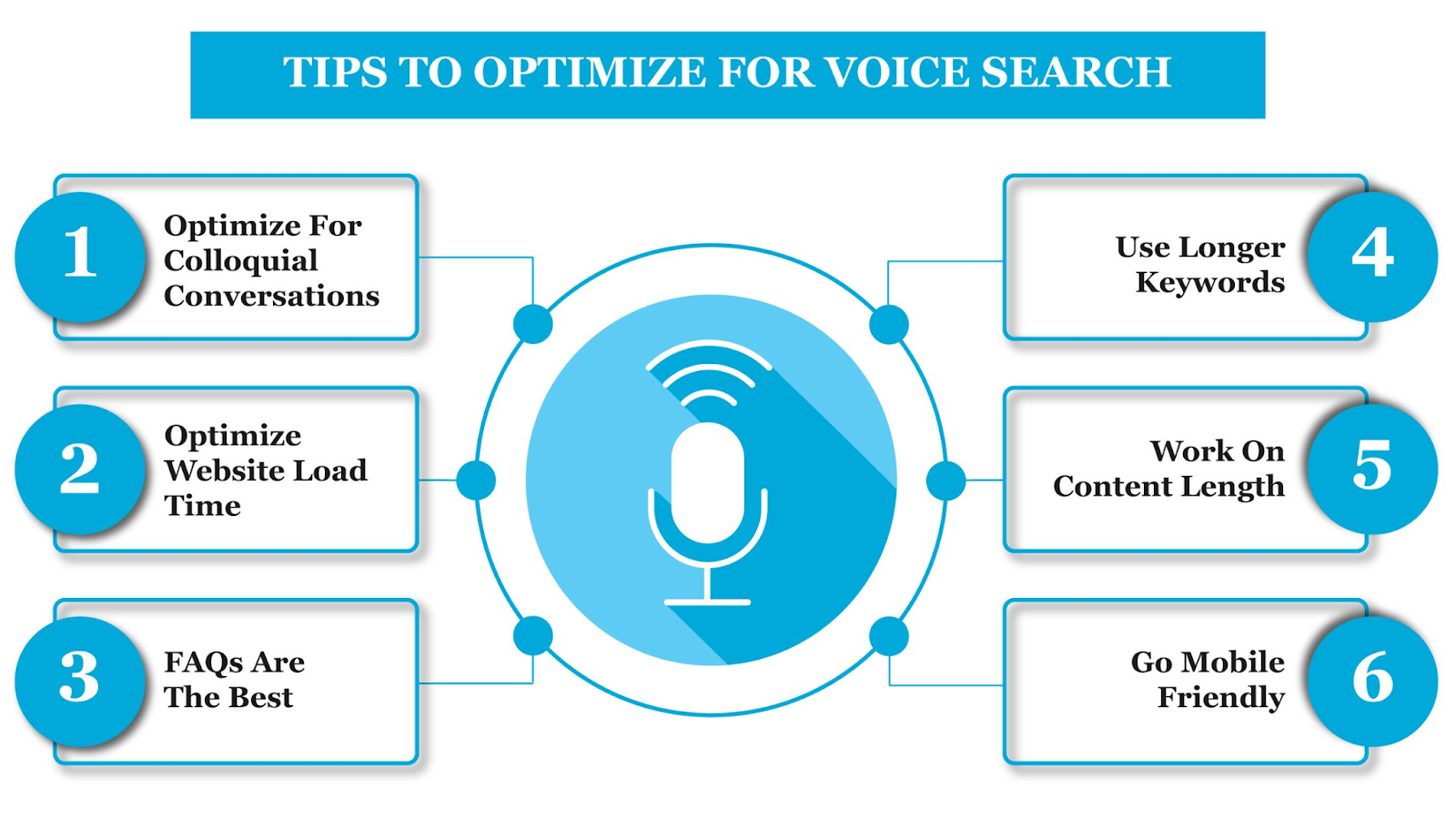
The Future of Voice Search and White Label SEO
Voice search technology continues to advance rapidly, creating new opportunities and challenges for businesses and agencies.
- AI-Driven Personalization: Voice assistants are becoming more predictive and personalized, using machine learning to understand user preferences and provide more targeted recommendations. This trend will require more sophisticated optimization strategies that consider user behavior patterns and preference signals.
- Multilingual Voice Search Optimization: As voice technology expands globally, multilingual optimization becomes increasingly important. Agencies serving diverse markets will need expertise in optimizing content for voice searches in multiple languages.
- Voice Commerce Growth: Shopping through voice assistants is growing rapidly, creating new opportunities for e-commerce businesses. Voice search optimization will need to include product descriptions, pricing information, and purchase facilitation.
- Natural Language Processing Advances: Improvements in natural language processing will make voice assistants better at understanding context, intent, and nuanced queries. This evolution will require more sophisticated content strategies that anticipate and address complex user needs.
- Zero-Click Search Impact: The rise of zero-click searches, where users get answers without visiting websites, affects how businesses approach voice search optimization. Strategies will need to balance providing helpful information with driving website traffic.
- Voice-Based Advertising: Voice advertising is emerging as a new channel for reaching consumers. Agencies will need to understand how voice ads work and how they interact with organic voice search results.
Transform Your Agency's Voice Search Strategy
Voice search optimization represents a significant opportunity for agencies willing to embrace this evolving technology. The statistics are clear: consumers are increasingly using voice search for business discovery, product research, and local information. Agencies that master voice search optimization now will have a competitive advantage as this trend continues to grow.
White label SEO services provide the expertise, tools, and scalability needed to implement effective voice search strategies across multiple clients. They handle the technical complexities, content optimization, and performance monitoring that make voice search campaigns successful.
The future of search is conversational, local, and immediate. Businesses that optimize for voice search will connect with customers at the moment they're seeking solutions. Agencies that offer comprehensive voice search optimization will position themselves as essential partners in their clients' digital marketing success.
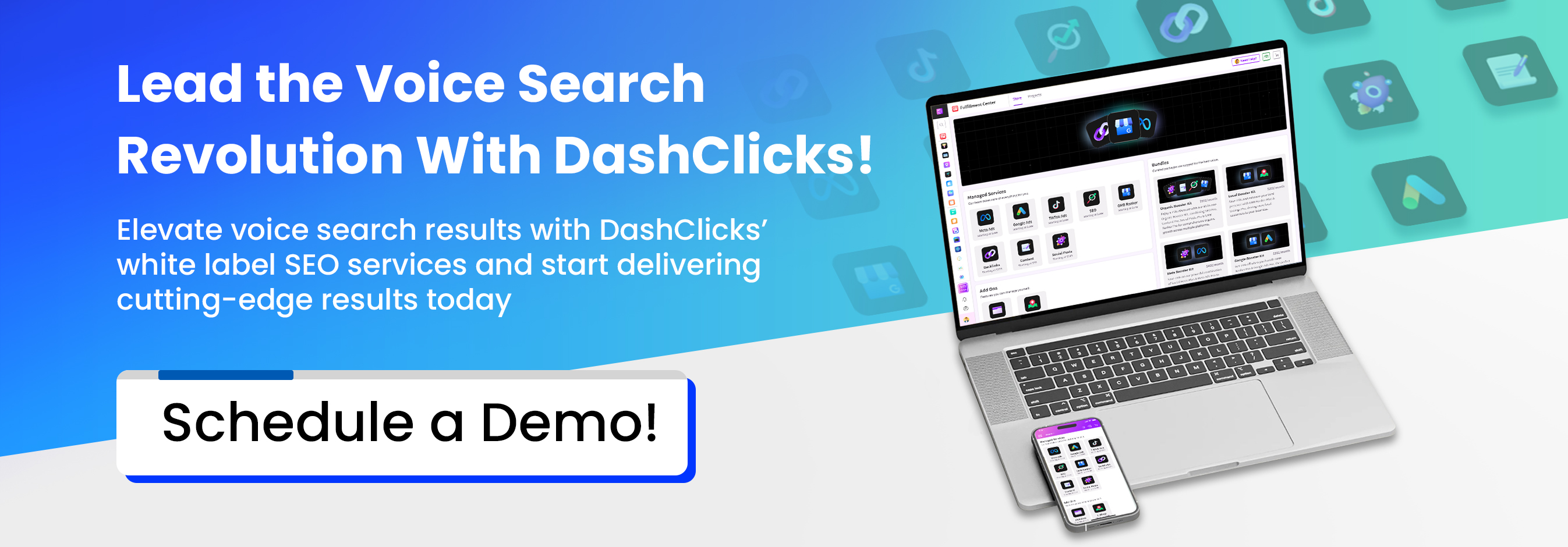


.svg)

.svg)
.svg)
.svg)
.svg)
.svg)

.svg)




.svg)
.svg)
.svg)
.svg)
.svg)